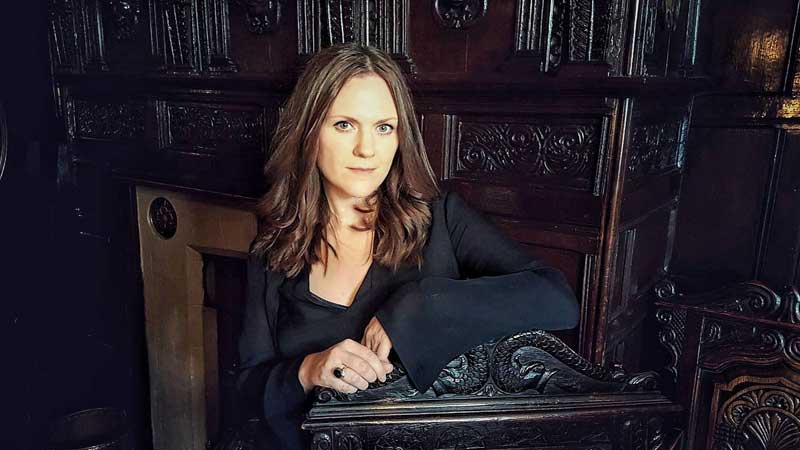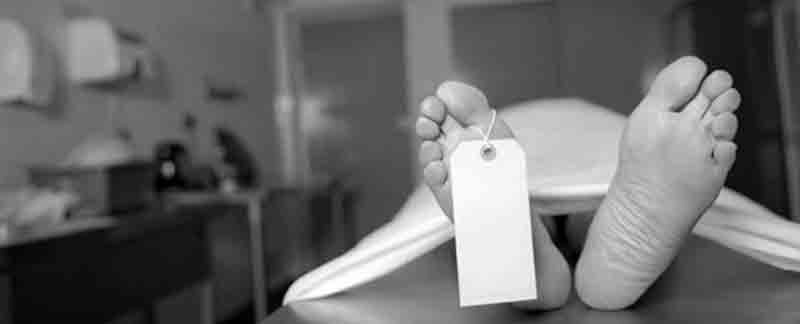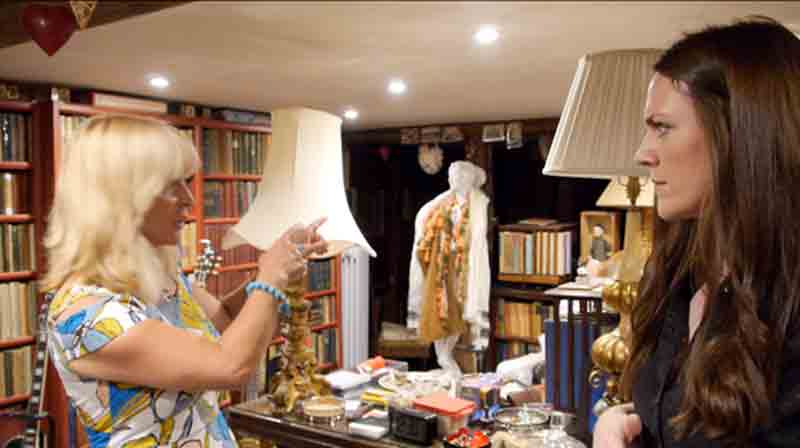Guest writer and paranormal investigator JAYNE HARRIS ponders life after death as she tells Spooky Isles about her new documentary ‘The Afterlife’
We all know it to be true… death has us all on its list. We have no idea when our number will be called, or how to journey will go, but it’s the only certainty we all face.
So why is it I wonder that most of us don’t like to discuss the subject? Fear possibly, but fear of what exactly?
Death is one of the most natural processes and yet we see it as macabre, depressing and taboo, something dark, even sinister. But death hasn’t always been viewed like this.

Our present day views have been formed in fairly recent times, and as a result of social norms, expectations and the media, society (generally speaking!) now focusses on the loss element of death.
What we will lose, what we may be leaving behind, or what the sadness of having to carry on living without our loved ones will feel like, and while these thoughts are obviously poignant and relevant, and the death of a loved one does indeed bring difficulty and sorrow, if we took a page from our ancestors book on the subject, we may feel very differently and we may even be able to deal with this inevitability with more ease and acceptance, for death would not be viewed as the end, but merely a transition.
Let me explain…
Our ancestors and death
If we could take a journey back through time we would at some point encounter a more primitive ancestor, probably living in a cave, busy building fires or hunting prey to feed their young (ok so I may be conforming to a stereotype here to a degree but the basis for truth is there) and this is exactly what we would expect to find.
What we wouldn’t necessarily be expecting would be these ancestors ability to have symbolic thoughts. Thoughts around what may be as well as what is.
Recent evidence from a site in La Chapelle-aux-Saints, France, suggests that as far back as 50,000 years, neanderthals were intentionally burying their dead and performing funerary rituals, which may have included the creation of adornments made from shells and decorative symbols. So if this is accurate, why would our ancestors be taking such care when it comes to the final resting place of their deceased, if they didn’t have some form of belief or faith about the destiny of those who pass before them. Clearly it would be quicker and more practical for these people to simply burn the bodies.

As a result of these finds, and discoveries made at similar sites around the world, Anthropologists are now beginning to wonder whether primitive civilisations actually held a belief in life after death. An afterlife.
If ancient civilisations DID believe in an afterlife…where did this belief come from? It must have been learned through interaction with each other. Caveman 1 must have at some point suggested or implied to Caveman 2 that there was a need to treat the dead body with respect, and to bury it carefully in a certain way, with specific objects. This goes against everything we thought we previously knew about early species. It seems they had the ability to imagine, and not only imagine but have faith.
So it seems that far from being a modern idea belief in another realm, a place we go to after this mortal life, has actually been around as far back as we can trace. It’s argued that it is this single thought, this faith in something greater to come that gave birth to all religion. After all, it is the one thing they all have in common. All religious faiths believe there is more to come once our physical body ceases to function. When we have finished with this vehicle we drive to work. Of course their opinions on what we are to expect vary somewhat, but the theme is there.
But back to our time machine for a moment, we leave the neolithic period and fast forward to the 15th century. We have no evidence that attitudes and beliefs around the afterlife changed much in the years we’ve missed whilst travelling towards the future, and certainly intentional burials have continued to happen with more imagination and grandeur in some places – the pyramids are one example.
The Middle Ages view of death
So now here we are in the middle ages and belief in life after death is not only common place, but people are now advertising the fact that they believe and propaganda around the subject is rife. Images of the afterlife, heaven, hell and purgatory adorn manuscripts, artwork, tapestries and more.
Death was very much at the centre of life for people during this time, which would no doubt make most of us modern day folk feel quite uncomfortable, however with high rates of infant mortality, famine, disease and so on, the people of the 15th century had no choice but to live with death lurking around the corner and as a result of this the way in which people lived their lives was very much dominated by their beliefs around what would happen to them when the final curtain fell. But what exactly did they believe? well for that one we’re back to religion.
It was the church who shaped the way in which this society viewed death, and they taught that not only do we all have a soul, but that a persons soul was judged by 2 things: how that person had behaved in life, and how they died. Medieval Christians hoped for nothing more in life than a good death. They wanted to be at home surrounded by their nearest and dearest and of course their Priest, This was clearly comforting was during their final hours, but also important because they believed that in the eyes of God this made them a good person and that they had died “properly” and would therefore be granted a spot in Heaven.
Ah Heaven! – yes that is about as detailed as Medieval society got when it came to what exactly came after life. It was Heaven. A place where they would feel no pain or suffering, would be reunited with loved ones who had passed before and may even be granted an audience with the big man himself…if you had been a good person. If you hadn’t, and had lived a life of sin well it was the fiery pit and an eternity of torture for you, that would be your afterlife. So as you can see, pretty black and white. You went one way or the other.
Rise in Spiritualist movement
This blueprint for life, death and what comes next held pretty steady for most people right up until the 19th century when with the rise in popularity of the Spiritualist movement, many people suddenly began to believe that there may well be an alternative to ending up in Heaven or Hell.
Maybe there was another realm? a spirit realm where all disembodied spirits go to and from where they might even be able to get back in contact with the living.
At this time there also seemed to be an increasing belief in a “middle place”, somewhere between the realms, a limbo where spirits could become trapped. It was usually these spirits that the Victorians believed they were making contact with, and to a large extent this continues today (how many modern day ghost hunters ask questions like “are you trapped here?”). So during the Victorian period we see for the first time, a need for evidence of an afterlife and this need has increased over time. Most people now simply cannot believe unless they have some form of evidence. Of course what constitutes evidence will vary from person to person.
An extension to the Spiritualism of the Victorian era is the modern day Paranormal Investigation, and this is one way in which many people believe they can, and have gathered evidence of survival. Life after Life.
For some people a powerful EVP (electronic voice phenomena) recording is enough to convince them, for others they need more visual evidence and so attempt to capture photographs of ghosts (there is a general consensus amongst paranormal enthusiasts that 2 forms of apparition exist, the Spirit (intelligent and able to communicate) and the Ghost (residual energy, a recording replaying over time).
Does EVP prove an afterlife?
Whether or not either of these are proof of an afterlife is up for debate, and certainly my own personal view is that Ghosts most certainly are not, and given that we don’t fully understand the workings of the human mind, I’m cautious about whether so called spirit interaction is good enough evidence either, as it’s possible that all we are doing when we seem to be connecting to the disembodied spirit of a once living person, is tapping into a huge swirling cosmos of data – a collective consciousness. But I digress….
With the rise in a need for evidence, there comes a rise is people seeking attention and one of the ways people can gain attention is by falsifying their evidence or experiences. But this doesn’t mean that all evidence and experiences are fake or elaborated. There are plenty of people out there who are level headed, and no nonsense who have no need to seek the attention of others in such a way.
We visited the home of Singer Toyah Wilcox recently and she spent quite some time talking to us about her very wide and varied supernatural experiences (she even shared with us the details of an exorcism carried out on her by her Priest as a child as her mother was so afraid of things that were occurring in the home). She also talked about dream visitations, time-slip theory and consciousness. We were shown to the cellar area where Toyah and her friends had experienced very disturbing things one evening. The figure of a monk, crying children and so on.

(‘Afterlife: The Documentary’ 2018)
The true nature of these sorts of experiences is still unknown. Maybe the stone tape theory explains them, or maybe it’s more to do with our own consciousness and our ability to tune into different frequencies where the energy from these events that have past is stored. Whatever the cause, it’s clear for many people that ghosts do not really provide evidence of an afterlife…but spirits possibly could.
Our journey through time has given us a glimpse, for the most part, into the beliefs and traditions of those of Christian faith but it’s worth exploring other faiths too, and some of them have quite profound theories on the fate of the human soul post death. Hindus for example believe that it takes many lives before a soul can reach the ultimate destination, and so we enter the field of reincarnation.
As a man casts off his worn-out clothes and takes on other new ones, so does the embodied soul cast off his worn-out bodies and enters other new”. – Bhagavad Gita 2:22
Reincarnation is an interesting concept and throws up many moral and social issues, but it can’t be denied that there do seem to be people out there, myself included, who have had unusual experiences, or can recall names, places and events which they shouldn’t have any knowledge of. I recently underwent past life regression on camera for my new documentary ‘Afterlife’ and I was admittedly very sceptical about the whole process initially, and even at the end, after almost 2 hours (which felt like 30 minutes to me I should add!) I was still unconvinced about where my visions and thoughts had come from. Were they born from different bits of TV dramas I’d watched and books I’d read, or were they genuine memories of a life long ago? I gave a name, the name of the house I lived in and described it in detail. I even went on to describe the buildings later uses. Following the session we did some research and did find some matches. I was shocked. But had I heard about this place, and this person before? maybe it was all stored in my subconscious. I’m still on the fence.
Science seeks to explain afterlife
Some areas of science are now looking to explain past life memories through the theory of genetic memory, which essentially suggests that we inherit memories from our ancestors in the same way we might inherit a large nose through DNA! it’s up for debate but would explain fears such as heights, snakes, spiders and so on as well as those things we consider comforting like the smell of bread baking or even for some the smell of a coal fire.
The idea of the human soul being eternal and capable of returning to this physical world even once the physical body has died seems the stuff of fiction to many people but medical science is now taking an interest in this concept both on a spiritual level, which we’ll come to later, and a physical one. Let’s deal with the physical first. What if we could be bought back to life, after death, as the same person we were before? Enter Cryonic Preservation.
What is Cryonic Preservation?
Cryonics is the low-temperature preservation of a human corpse, with the hope that resuscitation and restoration to life and full health may be possible in the far future. The Alcor Life Extension Foundation in Scottsdale, Arizona is the largest organisation of it’s kind in the world.
As part of my documentary we will be visiting Cryonics UK, an organisation charged with the task of beginning the preservation process as soon as it’s members have passed away, and then shipping them in large ice-packed metal coffins overseas. The process itself involves amongst other things, draining the body of blood and replacing it with a type of anti-freeze. Some members choose to simply have their heads frozen especially if their body had failed them during this life, but I have to admit that I am wholly uncomfortable with the idea of ending up a head in a container. A scene from Silence of the Lambs comes to mind!
Now the Cryonics debate throws up some huge questions about the existence of the human soul. What happens to the soul whilst the body is in a state of suspended animation? Is the soul suspended too, or does it go elsewhere? what about the families, do they grieve?
We spoke to Rupert Sheldrake about this:
What cryonics fails to take into account is that by the time these people are regenerated, if that is possible at some point in the future, the person, their personality and soul may have moved far away and have no desire to come back”. – R.Sheldrake (‘Afterlife: The Documentary’ 2018)
Of course the man in charge of Cryonics UK, and his many members have a very different view…one which we shall no doubt hear when we visit him soon.
So to return to the big questions: What happens when we die? Do we feel pain?
As I continue making this documentary, I am increasingly fascinated by one area…Near Death Experiences. It seems that this may be the only way we can actually gather scientific, measurable evidence of what may potentially await us all. The Alister Hardy trust has over 6000 first hand accounts of NDE’s and we spoke to Marianne Rankin their Director of Communications about those.
For most people we speak to, death does not mean everything goes blank, there is a process. People who come back to life report seeing and experiencing very similar things…it’s so consistent with each case and these are people who have no knowledge of our research or of each other”
– Marianne Rankin (‘Afterlife: The Documentary’ 2018).
Having studied these 6000 first hand accounts myself, and having spoken with people who have had their lives changed profoundly by a near death experience, I believe it can’t be denied that something is going on in these cases. There have been trials carried out in hospitals with patients in ICU and those who have been successfully revived after being declared clinically dead have reported some amazing things about their environment when they shouldn’t have had any awareness at all. This is one area I intend to investigate thoroughly for real evidence of survival of the soul…if there is survival at all!
What do you believe about the Afterlife? Is there a place we all go when our bodies finally grind to a halt? or is there blackness, nothing and we simply live on in the memories of our loved ones?
For me, this subject is universally significant. We will all die, and I believe that death should not be viewed as a macabre subject to talk about. Wouldn’t it be better if we all saw it as a chance to celebrate the life that has gone, and wish our loved ones well in their next adventure? Of course it’s not cut and dried, but today, more than ever before we do have the opportunity to really get our teeth into the topic – to examine ancient practises, religious faith, supernatural experiences and of course the latest scientific theories and medical evidence. These things can work collaboratively it’s hoped, in helping us understand this thing called death.
JAYNE HARRIS is a Researcher, Lecturer and independent Filmmaker with a passion for the unexplained. In 1998 Jayne founded HD Paranormal Research, an organisation that regularly investigates spontaneous cases of paranormal activity. With a degree in Psychology, and having spent 8 years working as a Counsellor Jayne is fascinated with human perception and theories around consciousness and is currently studying ‘Philosophy of the Mind’ at Oxford University. She is a frequent guest speaker for schools and universities as well as organisations such as the W.I and U3A. Named “Britains Foremost Female Paranormal Investigator” by VICE magazine in 2016 Jayne is an advocate of lifelong learning currently tutoring 2 successful distance learning courses in Paranormal Research. Her debut documentary “Who put Bella in the Wych-Elm?” was released in 2017 to sell out audiences. She is a regular guest on radio and TV worldwide and has worked behind the scenes as a Consultant for several networks including the BBC and the Travel Channel.
Jaynes latest project is a documentary entitled ‘Afterlife’ which is currently seeking support through crowdfunding. To learn more visit: www.crowdfunder.co.uk/afterlifedocumentary


